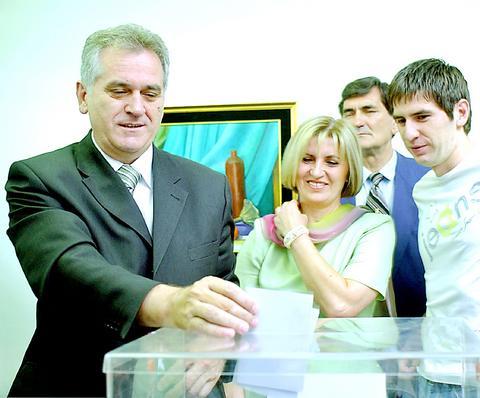
The hardline Radical Party attracted most support in Serbia’s general election, dashing Western hopes the nation blamed for a decade of war in the 1990s would finally turn its back on nationalism.
However, there was no certainty the Radicals, who won 28 percent of the vote on Sunday, could form a government.
The result cast a pall over European Union and United States expectations they would have a progressive Serb government to deal with when the future of breakaway Kosovo is decided and Serbia’s EU membership hopes, currently frozen, are re-assessed.
“We are convinced that hard days lie ahead of Serbia,” said Radical leader Tomislav Nikolic who claimed victory and acknowledged he needed to find a strong coalition partner.
Nikolic said the pro-Western bloc had “once more failed to fool Serbia’s citizens” and was now in panic.
Shrugging off warnings by Western envoys that chauvinist policies could lead to renewed isolation, voters underlined on Sunday the Radicals’ seemingly unbreakable bedrock of support.
The West’s great hope, President Boris Tadic, led his opposition Democratic Party to about 23 percent of the vote, nearly double its score in the 2003 election.
Tadic said the parties of pro-Western persuasion outnumbered the monolithic Radicals, as they did in 2003. As the biggest party in that bloc, his Democrats should form a government.
“This is really possible. We have a two thirds majority in our parliament,” Tadic said.
Outgoing prime minister Vojislav Kostunica, who echoed nationalist rhetoric in his campaign, won about 16 percent of the vote and gave no clue on who he might join in coalition.
“Coalition talks are ahead of us,” Kostunica told reporters. “We are open. We expect other parties to be responsible.”
LIMBO IN BELGRADE
Kostunica and Tadic were once allies in the battle to topple the late autocrat Slobodan Milosevic, who fell in 2000 and died in detention at the Hague in March 2006. They fell out after reformist premier Zoran Djindjic was assassinated by Milosevic loyalists in March 2003 and became rivals.
The Radicals’ official leader, Vojislav Seselj, is on trial in The Hague for war crimes. The party brought 30,000 protesters to the doorstep of the U.S. embassy early last month, accusing Washington of using the United Nations court to hound the Serbs.
Radicals would like to extend Serbia’s borders one day to embrace ethnic Serbs in Bosnia and Croatia, justifying the ethnic bloodshed of the 1990s when Yugoslavia fell apart.
They say Serbia should declare its Kosovo province “occupied territory” if NATO powers, as diplomats forecast, grant independence to the 90 percent ethnic Albanian majority.
They would refuse to arrest top war crimes fugitive Ratko Mladic, charged with genocide in Bosnia, and send him to the U.N. war crimes tribunal because they see him as a war hero.
The EU froze talks with Serbia eight months ago because of its failure to capture and deliver former Bosnia Serb Army commander Mladic. Nationalists hope Brussels will back down and talk to Serbia because Europe needs it.
Kosovo was taken out of Serbia’s hands seven years ago when NATO bombed for 11 weeks to force Milosevic to pull out his troops and end a counter-insurgency war that killed 10,000 Albanian. It has been run by the United Nations since 1999.
Kosovo’s fate may be decided in days. The Albanians have vowed they will never accept a return to rule from Belgrade and NATO peacekeepers are braced for possible violence.
German Chancellor Angela Merkel issued a vain plea on Sunday to Serbs not to vote nationalist. Her Russian host Vladimir Putin encouraged the Serbs to hang tough on Kosovo, saying Moscow would back them.
Belgrade-based Western analyst James Lyon predicted limbo in Belgrade over the breakaway province.
“There’s a very big possibility that no government is formed,” Lyon said. “No one wants to be in power when Kosovo gets independence.”
RELATED ARTICLES
- Europe to Begin Food Crisis War Games
- Italy Fines TikTok with 10 million euros over Repeatedly Exposing Children to Indecent Content
- New EU law on Emissions will Have Big Financial Impact on its Citizens
- Swiss Senate Approves Transfer of Russia's Money to Ukraine for War Reparations
- Majority of Moldovans in Favor of Joining EU but Against Eurasian Union and NATO poll finds












88… Hi from Iran! I am happy for Serbia with nationalists!